Cardinal Keith O'Brien: A churchman with a strong voice
- Published
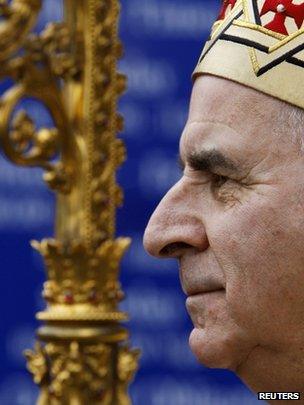
Keith O'Brien became a cardinal in 2003
Cardinal Keith O'Brien had a strong voice in his role as one of the UK's most senior Roman Catholic clergymen.
The 74-year-old stepped down as an archbishop last week after three priests and a former priest made allegations of improper behaviour against him dating back to the 1980s.
He has admitted he had initially contested the "anonymous and non-specific" allegations.
But he said in a statement on Sunday his sexual conduct had, at times, "fallen beneath the standards expected of me", and apologised and asked for forgiveness from those he had "offended".
He had recently sparked controversy when he locked horns with the Scottish government over its plans to enshrine same-sex marriage in law by 2015.
A year ago the cardinal put on record his view that gay marriage was a "grotesque subversion of a universally accepted human right".
His stance on abortion was also articulated in the clearest of language when six years ago he said the termination rate in Scotland was equivalent to "two Dunblane massacres a day".
And in 2008 he described the implications of the Human Fertilisation and Embryology Bill as akin to "Nazi-style experiments".
Born in Ballycastle, County Antrim, Northern Ireland, on the feast of St Patrick's [17 March] in 1938, the primary school-aged Keith Michael Patrick O'Brien travelled with his family over the Irish Sea to Clydebank.
He was still a young man when his calling to the priesthood came in the late 1950s after he had gained a bachelor of science degree in chemistry and mathematics from the University of Edinburgh.
Cardinal O'Brien studied for his vocation at St Andrew's College, Drygrange, Roxburghshire, and was ordained on 3 April 1965, a few weeks after his 26th birthday.
He then served as assistant parish priest and as chaplain of St Columba Secondary School in Cowdenbeath, where he taught maths.
He went on to become spiritual director of St Andrew's College in Drygrange and rector of St Mary's College, Blairs.
On 5 August 1985, Cardinal O'Brien was ordained Archbishop of Saint Andrews and Edinburgh.
Six years later he was awarded the Equestrian Order of the Holy Sepulchre of Jerusalem: Knight Commander with star.
From 1996 to 1999 he served as Apostolic Administrator of the Diocese of Argyll and The Isles and from March 2002 until 2012, Cardinal O'Brien was President of the Bishops' Conference of Scotland.
One of the church's top jobs came his way in October 2003 when he was created and proclaimed a cardinal by Pope John Paul II.
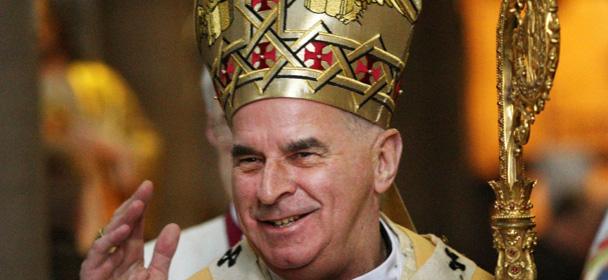
Keith O'Brien was created and proclaimed a cardinal by Pope John Paul II in October 2003
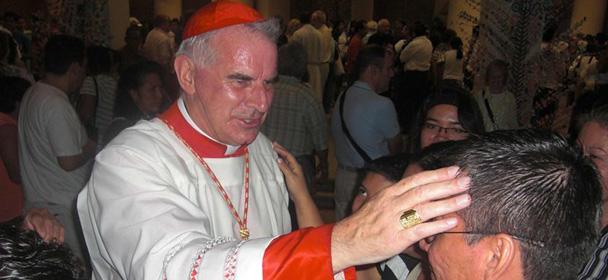
Cardinal Keith O'Brien in El Salvador for the 20th anniversary of the Jesuit Massacre
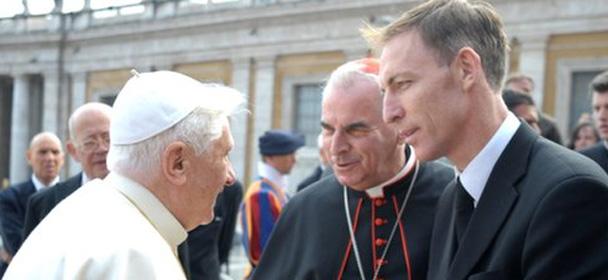
Cardinal Keith O'Brien introduces East Renfrewshire's Labour MP Jim Murphy to Pope Benedict during a visit to Rome
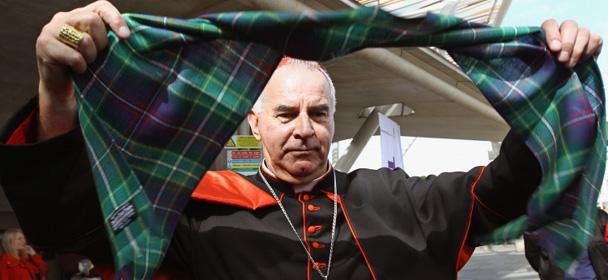
Cardinal Keith O'Brien holds aloft a special tartan commissioned to mark Pope Benedict's visit to the UK
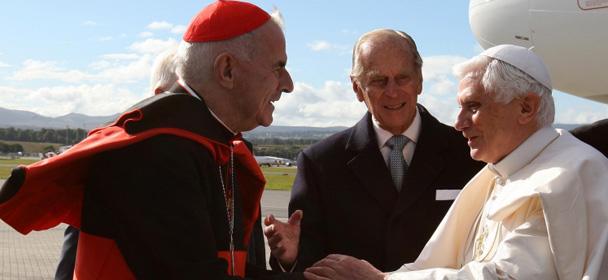
Pope Benedict met Cardinal Keith O'Brien in Edinburgh, the first stop during his state visit to the UK
A decade on, he has stepped down as the Archbishop of St Andrews and Edinburgh.
Cardinal O'Brien had been due to travel to Rome to take part in the conclave to choose a new Pope to succeed Benedict XVI.
However, he has decided not to make that journey, saying that he did not want to be the focus of the media attention.
In an interview conducted before the controversial allegations were made, he said said that some issues - for example abortion and euthanasia - were "basic dogmatic beliefs" of "divine origin" which the church could never accept.
But he believed it would be within the scope of the new Pope to consider whether the Roman Catholic Church should change its stance on other issues, which were not of divine origin.
He explained: "For example the celibacy of the clergy, whether priests should marry - Jesus didn't say that.
"There was a time when priests got married, and of course we know at the present time in some branches of the church - in some branches of the Catholic church - priests can get married, so that is obviously not of divine origin and it could get discussed again."
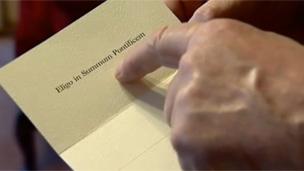
The voting card to choose the Pope, with the words: "Eligo in Summum Pontificem"
Cardinal O'Brien said he had never personally thought about whether he wanted to get married as he had been "too busy" with his duties.
But he added: "In my time there was no choice and you didn't really consider it too much, it was part of being a priest. When I was a young boy, the priest didn't get married and that was it.
"I would be very happy if others had the opportunity of considering whether or not they could or should get married."
During his interview with the BBC's Glenn Campbell, he held a simple brown card used to choose the next Pope, containing the words: "Eligo in Summum Pontificem."
He ran his fingers over the words and told the journalist: "I choose to the supreme Pontiff and then dot, dot, dot, and you choose the name."
Cardinal O'Brien played his part in the election of Pope Benedict XVI, whose resignation he called "shocking and sad".
But for this election, he will not join other cardinals in Rome and will not write his chosen name on that simple brown voting card.
- Published25 February 2013
- Published24 February 2013
- Published22 February 2013
- Published2 November 2012
- Published19 August 2012
- Published16 July 2012